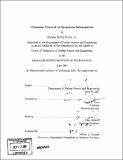Coherent control of quantum information
Author(s)
Henry, Michael Kevin
DownloadFull printable version (6.146Mb)
Other Contributors
Massachusetts Institute of Technology. Dept. of Nuclear Science and Engineering.
Advisor
David G. Cory.
Terms of use
Metadata
Show full item recordAbstract
Quantum computation requires the ability to efficiently control quantum information in the presence of noise. In this thesis, NMR quantum information processors (QIPs) are used to study noise processes that compromise coherent control, to develop useful techniques for detecting noise, and to explore effective noise-protection schemes. A quantum simulation of the quantum sawtooth map in the perturbative parameter regime is used to study the effects of experimental noise on quantum localization, a highly sensitive quantum interference phenomenon that depends on the coherence of the localized state. Experimental data and numerical simulations show that the decoherent noise known to act on the system is relatively inconsequential in this implementation of the map, and that incoherent noise is the biggest challenge to implementing localization. While many incoherent processes appear decoherent, there are important differences. The distribution functions underlying incoherent processes are either static or slowly varying and so the errors introduced by these distributions are refocusable. The influence of incoherent noise is further explored in an experimentally implemented entangling operation, where incoherence can be difficult to separate from decoherence. By studying the fidelity decay under the cyclic entangling map, the effects of incoherence are easily distinguished from decoherence in experimental data. Decoherence free subspaces (DFSs) provide some of the most efficient schemes of avoiding decoherence from noise sources with underlying symmetries. (cont.) To achieve an internal Hamiltonian structure that naturally fits a DFS encoding over a well-defined Hilbert space, we employ liquid crystal solvents to partially align a four-proton spin system, reintroducing the spin-spin dipolar couplings. In these experiments, enhanced coherent control is achieved by encoding logical qubits in a DFS. Robust control sequences enable high fidelity control in the DFS even when the system Hamiltonian is known with some uncertainty.
Description
Thesis (Ph. D.)--Massachusetts Institute of Technology, Dept. of Nuclear Science and Engineering, 2006. Includes bibliographical references (p. 93-104).
Date issued
2006Department
Massachusetts Institute of Technology. Department of Nuclear Science and EngineeringPublisher
Massachusetts Institute of Technology
Keywords
Nuclear Science and Engineering.